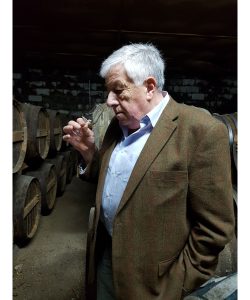Hermitage Cognac Quality Control
There are many producers of cognac in the legal production area of France known as The Charentes and Charentes Maritime. Each one of them, quite naturally, believes that their cognacs are the best. The truth, however, is rather different. Producers don’t advertise their presence so most have probably only ever tasted different cognacs in bars and restaurants. Indeed, I have spoken to some producers who didn’t even know that they had a distillery next door. This lack of local industry awareness has, over the years, resulted in the development of our own cognac quality control.
There are of course standards to which all cognac houses must rigidly adhere. Variations in the product occur naturally with changes in the terroir, vines, distillation, cellars etc. These changes can dramatically change the quality of each cognac. As a rule, the higher the cru, the better the cognac, but one cannot rely on this as a guarantee of quality.
As negoçiants we try to limit the cognacs we buy to those produced in the top cru, Grande Champagne. Here, hundreds of cognacs are produced, and each has a different taste, age, style, colour, method of production, ageing process, strength and balance. On top of that, our customers have varying tastes and needs and we try to accommodate them all. Finding the right cognacs is objective since we have our own cognac quality control standards which we have developed over the years. These standards are not necessarily subjective however, since more than a third of all our cognacs have won gold medals or above in cognac competition.
 Making sure that our customers really do get the best means that, after we have decided on a potential cognac, we still need to do several tests. The first is of course tasting. It is difficult to say how many cognacs we taste but on some days, it may be twenty or even thirty, others, maybe only one or two. One tends to gather considerable experience when tasting many different cognacs. Then we check the cognac for balance which means balancing the fieriness against flavour. Sometimes we need to reduce the cognac slightly which in some cases take quite a long time. We also check it for sediment as some distillers don’t filter their cognacs before we receive them at our bottling plant. The alcohol level is also tested as legally, this must be quoted on the label. This process also involves checking the level of obscuration (factors which mask the true alcohol content). There is always some natural obscuration which cannot be avoided but in modern blends, the addition of sugar and caramel increases the level considerably.
Making sure that our customers really do get the best means that, after we have decided on a potential cognac, we still need to do several tests. The first is of course tasting. It is difficult to say how many cognacs we taste but on some days, it may be twenty or even thirty, others, maybe only one or two. One tends to gather considerable experience when tasting many different cognacs. Then we check the cognac for balance which means balancing the fieriness against flavour. Sometimes we need to reduce the cognac slightly which in some cases take quite a long time. We also check it for sediment as some distillers don’t filter their cognacs before we receive them at our bottling plant. The alcohol level is also tested as legally, this must be quoted on the label. This process also involves checking the level of obscuration (factors which mask the true alcohol content). There is always some natural obscuration which cannot be avoided but in modern blends, the addition of sugar and caramel increases the level considerably.
We really do try hard to provide our customers with the very best and we are proud of our collection of Hermitage Cognacs. Being a small, artisan producer is a huge benefit to everybody. If we were big, we would have to blend to supply cognacs with more commercial affordability. Each cognac would lose its individuality and we would probably have to rely on younger cognacs to produce the required quantity. We know Hermitage is always the best cognac available for our customers’ needs but it can be difficult to easily communicate that with every bottle we sell.
